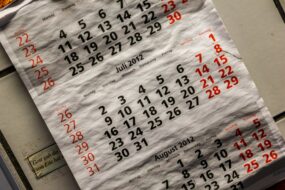October 19, 2023 • Life for Leaders
Scripture — Matthew 22:15-22 (NRSV)
The Pharisees went and plotted to entrap Jesus in what he said. So they sent their disciples to him, along with the Herodians, saying, “Teacher, we know that you are sincere, and teach the way of God in accordance with truth, and show deference to no one; for you do not regard people with partiality. Tell us, then, what you think. Is it lawful to pay taxes to the emperor, or not?” But Jesus, aware of their malice, said, “Why are you putting me to the test, you hypocrites? Show me the coin used for the tax.” And they brought him a denarius. Then he said to them, “Whose head is this, and whose title?” They answered, “The emperor’s.” Then he said to them, “Give therefore to the emperor the things that are the emperor’s, and to God the things that are God’s.” When they heard this, they were amazed; and they left him and went away.
Focus
God ultimately rules over light and darkness, weal and woe, leveled mountains and straight roads—and over the exchange of money.
Devotion
I’ve told the story in previous Life for Leaders devotionals about how I came to be involved with the broad movement interested in faith, work, and daily discipleship which De Pree is a part of. Before I worked for De Pree and the Theology of Work Project, I worked as the manager of a faith and work blog channel on the religion website Patheos.
One of the bloggers I recruited to the channel, ethicist Dr. Sarah Conrad Sours, wrote a blog post many years ago which remains one of my favorite things I ever oversaw the publication of. (Don’t diagram that last sentence.) It was part of a series on breathing life into workplace conflicts, and it was based on this passage of Scripture which we have set before us for this upcoming Sunday, and it was called “Money Doesn’t Exist.” I’m tempted to quote the whole thing (I hope you will read it), but here’s a rather large taste:
Money is a medium of exchange. It symbolically represents that for which it stands in exchange. It has no intrinsic value. It represents real things, which gives it an air of reality, but it has no substance. It is mere representation.
It represents some of the things it represents fairly well; others, it represents exceedingly poorly.
It represents work, but it is not work. It does no work itself, for all the economic jargon to the contrary. You cannot put your money to work, it does not make anything, and it certainly does not spontaneously generate more of itself. . . .It represents power, but it is not power. It does not even have power, although those who possess lots of it seem to . . . . It represents security, and it is even a security. But it is not security. It must be exchanged–for weapons, for medicine, for a plane ticket, for food–to secure anything. . . .
Looking at numbers on a balance sheet or on a paycheck or on a bank statement or at the bottom of a receipt or at the bottom of a checkbook register, it is easy to forget that they are less real than the things for which they stand as symbols–the food, the candles, the work, the medicine, the roofs, the coffins, the cradles, the years of mutual goodwill, the people and the good they have done and the goods they need done to and for them . . . .
Dr. Sours rooted these reflections in what Jesus had to say in Matthew 22 when he was approached by the Pharisees. Once again they were trying, during what we now know as Holy Week and after his triumphal entry on Palm Sunday, to entrap him in a statement which they could take action against. There was already a group (the Zealots) opposed to the very Roman tax that the Pharisees were asking about, and the Pharisees may well have thought that Jesus would play to the crowd by agreeing that this tax should be resisted. If Jesus had done so, it would have been grounds to arrest him.
Instead, Jesus trapped the Pharisees right back. He got them to admit the coin used to pay the tax had the emperor’s head on it, and told them—in a sentence we have been arguing about for two thousand years—“Give therefore to the emperor the things that are the emperor’s, and to God the things that are God’s.” In the KJV the phrase is “render unto Caesar the things that are Caesar’s,” and in that form, it’s become almost proverbial. People have used it to urge tax payment and tax resistance, obedience to the state, and rejection of the state.
But I think one of the most important things to remember about this passage, though, is the same point that Isaiah made yesterday: God is in control. He ultimately rules over light and darkness, weal and woe, leveled mountains and straight roads—and over the exchange of money. Some form of exchange is necessary to live together in a society, and money is the one we’ve got. But it should never become our idol, our security, our source of identity and power.
Dr. Sours said it better, though:
I like to imagine that this is what Jesus was trying to do with his famous “render therefore unto Caesar” saying. Look on all creation and marvel at what God can make! Look at people and figs and stars and onions and fish. Look at the ideas God can come up with! Justice and mercy and sex and childbirth and lactation and sunrises and worthy work and friendship.
And look at Caesar, bless his heart. This economic system, this political nightmare, this collection of weapons, this puny little coin stamped with a crude image of a man making utterly ludicrous claims to divinity–that’s the best he can do with all his power. Let him have it if he wants it. It’s nothing, compared with what God can make, with what God has given, with what God asks of you.
Reflect
What does God ask of you?
Act
One of the great traditional hymns expressing the power of God in the creation, ordering, and government of the world is “Sing Praise to God Who Reigns Above,” originally written in the 17th century. This recording was made during the pandemic (which accounts for the social distancing of the choir.) Lyrics are on the screen. Ponder the affirmation of God’s power even in the face of tragedy, and ask yourself how you can, as the song says, “cast each false idol from its throne.”
Pray
(Prayer for the Twenty-First Sunday after Pentecost in the Book of Common Prayer) Almighty and everlasting God, in Christ you have revealed your glory among the nations: Preserve the works of your mercy, that your Church throughout the world may persevere with steadfast faith in the confession of your Name; through Jesus Christ our Lord, who lives and reigns with you and the Holy Spirit, one God, for ever and ever. Amen.
Banner image by Gertrud Oswd on Unsplash.
Find all Life for Leaders devotions here. Explore what the Bible has to say about work at the unique website of our partners, the Theology of Work Project’s online commentary. Reflection on today’s Life for Leaders theme can be found here: Paying Taxes (Matthew 17:24-27 and 22:15-22).
Subscribe to Life for Leaders
Sign up to receive a Life for Leaders devotional each day in your inbox. It’s free to subscribe and you can unsubscribe at any time.

Jennifer Woodruff Tait (PhD, Duke University) is the editor of and frequent contributor to Life for Leaders. She is also the managing editor of Christian History magazine and web editor for the Theology of Work Project, and a priest in the Episcopal Church. She has written a book of poetry, Histories of Us. Jennifer lives in Berea, Kentucky, with her husband, Edwin, and their two daughters.
Click here to view Jennifer’s profile.




